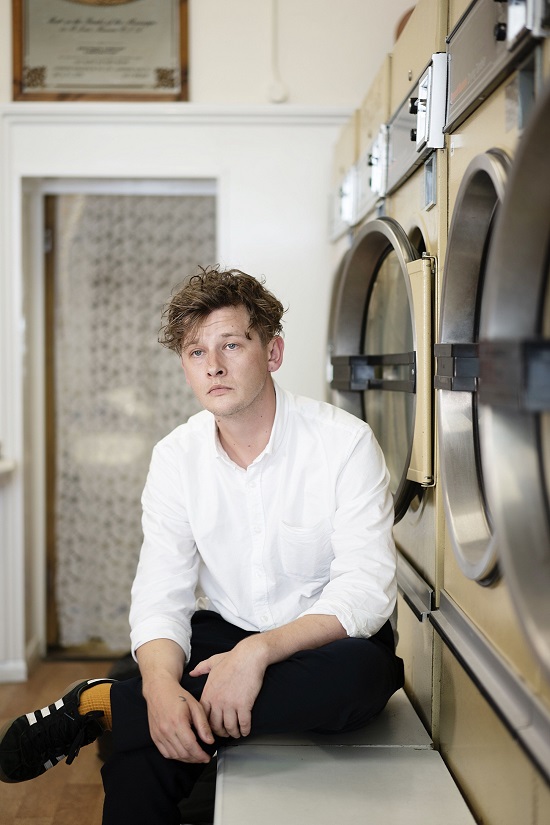Photos by Ki Price
The Wirral. The Leisure Peninsula. The Oblong of Dreams. The ‘other side’ of the Mersey has given us Half Man Half Biscuit, Pete Burns, Orchestral Manoeuvres In The Dark, The Boo Radleys, John Peel, Forest Swords, Outfit, Elvis Costello and two of the founders of the BBC Radiophonic Workshop. Today it’s the birthplace of a colossal crop of rising talent, of brilliant art-rock outfit SPQR, righteous queer power punks Queen Zee, the roster of the vital Eggy Records collective and more. Yet so often the peninsula’s rich musical heritage is overlooked, its artists often categorised simply as ‘Liverpool bands’.
Future Yard Festival, which takes place in Birkenhead later this month, aims to artistically reclaim The Wirral. It draws on the area’s cultural heritage and current creative fertility for what they hope will be a step to help establish the national musical identity it so richly deserves. It features the very best of the area’s rising artists, plus a fine array of national and international talent, from Anna Calvi to Audiobooks, Nilüfer Yanya to Black Country, New Road.
“If the musical identity of The Wirral was more celebrated, perhaps people wouldn’t feel the need to just move you over to the nearest city,” says Bill Ryder-Jones, one of Future Yard’s two headliners. Born, raised and still based in West Kirby, where he runs a recording studio, as a teenager he was a founding member of The Coral, and after departing the group established an ambitious solo discography defined by lush musicianship, tender and introspective songwriting and plenty of inspiration from the landscapes and characters of his home peninsula. One of his best and biggest songs is called ‘Two To Birkenhead’, from the album West Kirby County Primary, after all.

“I’ve always prided myself on being the most wool you can be,” he jokes over the phone. “I was born in Warrington to a father from Bolton and a mother from Formby with Welsh heritage, grew up in Manchester and moved to the Wirral.” For those unversed in Merseyside slang, a wool is a derogatory term used by Scousers to describe people from areas near to Liverpool, but not the city itself. Future Yard is being affectionately referred to by Wirralians and Scousers alike as Woolstock.
Ryder-Jones holds great affection for West Kirby, a picturesque town near the coast, seven miles from Birkenhead. “If you turn left out of my mother’s house you can see the river Dee and North Wales,” he describes. “I love being at the water, I walk the long way to my studio every day so I can be by it. I walk from my house to the studio through a lovely park, then on to the beach and back around, it’s one of my favourite places in the world. It’s funny how I tried to escape it for all of my 20s before I gave in and said ‘this is where I’m meant to be’. I still live in my West Kirby bubble, and I live there mainly because no one cares what I do. If I go to Liverpool, people say ‘oh I like your music,’ whereas in West Kirby they just remember me from school. Or they wanna ask how The Coral are doing,” he laughs.
Growing up on the peninsula, Ryder-Jones fell in love with the great Liverpool groups – The La’s, Shack, The Bunnymen and The Teardrop Explodes – but found even greater affinity with the Welsh, particularly that country’s distinct strain of psychedelic weirdness. “We were always conscious of not being from Liverpool,” he says, “constantly being made aware by people, but when we discovered Gorky’s Zygotic Mynki and Super Furry Animals it was like ‘oh, we live closer to them than we do to The La’s in Huyton’. In Liverpool at the time the tastes of all the people we were playing with was very Captain Beefheart and Love, lots of blues and roots music, everything had to sound really organic, but we felt an affinity to those groups who were slightly stranger and not as cool, who seemed a little odd and on the outside. I think as a young person you look to people in your area that you can relate to, and being from The Wirral you’re neither here or there. You aren’t Liverpudlian, you aren’t a Scouser, you want an identity that makes sense. The way the English have treated the Welsh for centuries, it puts them immediately on the outside too.”

One thing that Future Yard aims to do is to provide that musical landmark for the area’s musicians, a place they can showcase their own identity, rather than being shunted to the nearest ‘big’ city. It does not aim to provoke creativity in the citizens of Birkenhead and The Wirral, rather to provide a platform for the teeming scene that’s already there, showcasing it in beautiful venues like Birkenhead’s town hall and Birkenhead Priory, the oldest standing building on Merseyside. “It could be such a great thing for people from the peninsula to aspire to play,” says Ryder-Jones. “We didn’t have any of that, but what we did have was lots of beaches and hills, and time on your hands. In that sense The Wirral breeds creativity, especially if you’re a teen who feels on the outside of what’s popular, which is how I felt.”
The creative pull of the peninsula is keenly felt on Ryder-Jones’ 2015 album West Kirby County Primary, and its lead single ‘Two To Birkenhead’. “I remember thinking of titles and I had a song called ‘The West Kirby County Primary’. I thought it sounded like a jail. I was quite upset when they changed the name to West Kirby Primary. I made it when I was getting my act together, at that point I was hanging around local places, because I was quite anxious and I wasn’t travelling much, and I guess I just wrote about what was happening. ‘Two To Birkenhead’ is a song about a time I wasn’t looking after myself, when I was with a Liverpudlian girl who wanted to hear all about the famous ‘one-eyed city’ [a Scouse term for Birkenhead based on the single clock face on its landscape, as seen from across the water]. It’s a waster’s song, but with those songs it doesn’t actually matter what It’s about, you know, what matters about that song is when I do it at a gig people from Birkenhead can sing along.”
The musician laughs, “I mean I’m not a part of the tourist board,” perhaps a little uncomfortable in the role of cultural ambassador for the peninsula we’re demanding from him, but he’s nonetheless eager to extol the virtues of his fellow Wirral musicians. He’s keen to praise the Eggy Records collective, for example, home to fast-rising indie trio Eyesore & The Jinx, swarming gloom-merchants The Wild Fruit Art Collective, performance-pop genius Beija Flo, supremely talented young songwriter Bill Nickson (all of whom are on the Future Yard bill) and more. “I think it’s people like them that make the difference, linking artists together and creating a sense of community rather than what we had which was tribal fucking one-upmanship. I think they’ll produce some really great things.”
Particular praise is reserved for By The Sea, however, a band whose two albums (produced by Ryder-Jones) are glisteningly beautiful and unbearably overlooked in equal measure. “Liam [Power, By The Sea frontman] is always freaking out about how little music he’s got out there, but I always remind him he’s got two exceptional albums, and that if he’s got the patience to wait for people to realise how great By The Sea were, then there’s no doubt that they’ll be seen as an important band. It’s truly unfortunate that some groups just don’t hit that timing, but they’re one of my favourite Wirral bands ever. Liam is still one of the very best songwriters in the North West. I’d argue he’s the second-best songwriter on The Wirral…”
Future Yard Festival takes place 23-24 August in Birkenhead, and is headlined by Bill Ryder-Jones and Anna Calvi. For tickets, and the full line-up, click here



